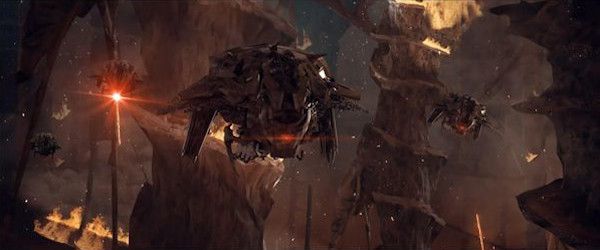Eye For Film >> Movies >> Invasion Planet Earth (219) Film Review
Invasion Planet Earth
Reviewed by: Jennie Kermode

Few cinematic genres inspire as much devotion or attract as much fan input as science fiction. Invasion Planet Earth is a film that took 17 years to reach the screen, financed through crowdfunding and made possible by the enthusiastic participation of hundreds of extras who just wanted the chance to be part of it. Though not entirely successful as a piece of cinema, it's an outstanding achievement, especially as it's now getting a big screen release. It's a film that will have a lot off nostalgic appeal to fans and will doubtless inspire some to flex their own filmmaking muscles in an age where it's getting easier than ever to turn imagination into a shared experience.
It begins with a tribute to low budget genre TV series of yore, watched by a younger version of main protagonist Tom (played through most of the film by Simon Haycock), who subsequently runs around outdoors with his friends pretending to be cyborg hero Kaleidoscope Man. Like most such boys he has to accept a more mundane occupation in adulthood, working as a doctor in a psychiatric hospital. He also experiences tragedy with the loss of his daughter. But perhaps that early TV education wasn't wasted, because on the day she tells him that she's pregnant again, aliens invade the Earth.

Or do they? The title here is a wee bit misleading. Whilst there aren't many original takes left on this kind of scenario, writer/director Simon Cox has found his own path to follow. Along the way he packs in numerous playful genre references that will amuse the fans. There's some impressive (if not very original) spaceship design work, perhaps thanks to contributions from Matt Allsopp, who worked on Rogue One, and a mixture of old-fashioned effects and CGI means it looks a lot better than one would expect for a low budget enterprise. Cox has a background in editing which proves to be an asset and he makes a lot out of limited locations.
Where it falls down, as so often, is in the writing and the acting. The latter is serviceable and genre fans are likely to be patient with the occasional bit of ham, but Haycock lacks the necessary charisma for a leading role of this sort, especially as he has to play someone who spends much of the film in an understandable state of depression. As if recognising that he can't do it all on his own, Cox has really layered on the sentiment in his depiction of Tom's relationship with his wife, resulting in a soap opera dynamic which alternates between tedium and unintentional humour. The power ballad over the end credits (sung by Eighties pop star Toyah Willcox, who also has a cameo) sums up the problem, though it's perfectly in keeping with the period style of the film.
Excessive sentiment oozes through the film, leaking out of every pore and making it hard to feel any real emotional connection with the characters. It's a problem that's all too common in slow-moving projects like this, where those at the helm have time to fall in love so deeply that by the time they need to decide which scenes to cut and how to work in the score, they're blind to their failings. As a critic, addressing such problems feels like kicking someone's baby, but honesty must come first - and it is still fair to say that there' are still things here to admire.
Cox is in difficult territory dealing with characters who are mentally ill, yet whilst one might see the changes they go through as somewhat trite, there's an interesting counter-narrative here looking at how Tom is affected by being forced to recognise them not just as patients but as whole people. The film has a pulp science fiction perspective on the importance of humanity, ignoring its relationship with a wider ecosystem, but that's par for the course.
If one looks at the central thrust of the story in a similar way, it works well enough, and it's understandable as a product of our current age even if one might be left with a degree of longing for the days when science fiction sought to inspire us to take responsibility and solve problems for ourselves. It's ironic that the kind of drive it took to make this film is exactly what's missing from the story it tells. Shooting for the stars should always be commended but Cox falls short, leaving us stuck in a cloud.
Reviewed on: 30 Nov 2019
















